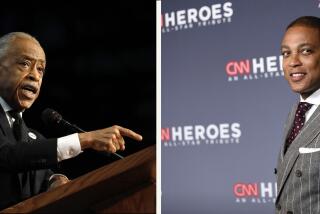Sharpton Helps His Party Build a Bridge to the Past
Al Sharpton for president? Why not? It seems like every Democrat with name ID and an ego to match is eyeing the partyâs 2004 nomination. And although Sharpton wonât be the Democratic nominee--he canât even win a primary in New York City--he will tilt the playing field to the left, and that will hurt the Democratsâ chances of recapturing the White House.
Sharpton has been a prominent activist--a demagogue, many would say--in the Big Apple for nearly two decades. If he is not so well-known nationally, that could change once he takes his show on the road.
Sharpton, an African American preacher with a flowing mane of hair, a sharp taste for clothes and an even sharper taste for controversy, will remind older Americans of Adam Clayton Powell, Jr.--the Harlem congressman who grabbed headlines in the 1950s and â60s.
Sharpton revealed his latest ambition in this weekâs Time magazine: âI feel that the Democratic Party must be challenged in 2004 because it didnât fight aggressively to protect our voting rights in Florida.â The voters as a whole might be tired of hearing about dangling chads and butterfly ballots, but hard-core Democrats are still angry about the Florida fiasco. And many blacks regard what happened in the Sunshine State as symptomatic of what they see as the de-emphasis of black concerns during the Clinton years.
Look ahead with hope, or look back in anger? Thatâs the question that every political party confronts when it loses the White House. Indeed, a predictable cycle emerges in both parties in the wake of a presidential defeat: The activist base invariable leaps to the conclusion that the former incumbents at 1600 Pennsylvania Avenue âsold out.â That is, they were too conciliating and compromising. The answer, according to this line of thinking, is to return to the true-believing faith.
Consider what happened to the Democrats after President Carter was defeated in 1980. Carter was a generally ineffective president, but even when he was in office, many Democrats thought his problem was that he was too conservative. And so once Carter went home to Georgia, the Democratic Party went âhome,â as it were, to its base in the liberal North. Hence the 1984 presidential nomination went to Walter Mondale, a Minnesotan with impeccable liberal credentials.
The problem with this strategy, of course, is that itâs entirely driven by an intraparty dynamic; it pays no heed to the mood of the general electorate. In 1984 the voters were not interested in returning to the glory days of the New Deal and the Great Society, and so Mondale was walloped even worse than Carter. Indeed, the Democrats didnât recapture the White House until they ran a certifiable âNew Democrat,â Bill Clinton, in 1992.
And when George H.W. Bush lost the White House in 1992, the same cycle started up on the Republican side. Only a hard-core Republican could possibly have thought that Bob Dole, the party warhorse who promised to âbuild a bridge to the past,â was the best candidate to put forth in 1996. Only after that defeat did the GOP turn to someone new. George W. Bush may have had a familiar name, but his âcompassionate conservativeâ message was a decisive--and effective--break with party orthodoxy.
So now the Democrats are back on the outside once again. The partyâs serious â04 hopefuls will want to look ahead to new issues, but they will have to be respectful of Sharpton and those who wish to nurse old grudges. This is a familiar dynamic, and it explains why it usually takes the âoutâ party eight years to win back the White House.
More to Read
Get the L.A. Times Politics newsletter
Deeply reported insights into legislation, politics and policy from Sacramento, Washington and beyond. In your inbox three times per week.
You may occasionally receive promotional content from the Los Angeles Times.










